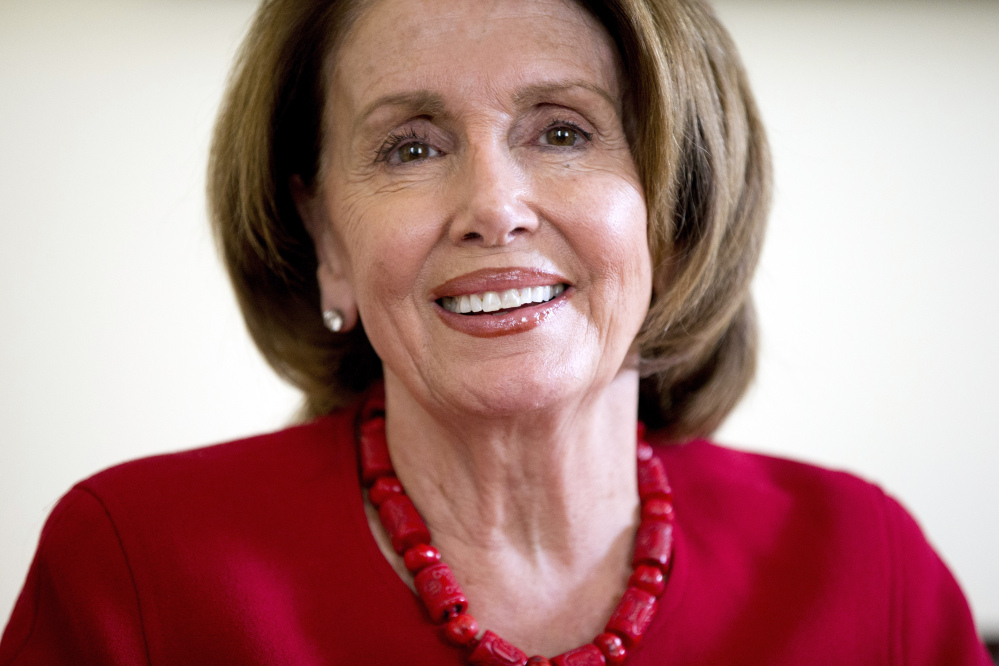WASHINGTON – As House Speaker, Nancy Pelosi delivered the signature achievement of President Barack Obama’s first term: his health care bill. Now Obama’s top second-term goal, a major trade deal, hangs in the balance on Capitol Hill and Pelosi is again on the spot.
But this time, the California Democrat, now minority leader, finds herself out of step with her party’s president – caught between his ambitions and the overwhelming opposition of her Democratic caucus to a free-trade deal many fear could harm American workers.
And it remains to be seen whether the 75-year-old Pelosi, in her 15th term and perhaps approaching the end of her congressional career, will help Obama get his trade bill over the finish line – or side with the labor unions and liberals who oppose the legislation, even though its failure would constitute a humiliating defeat for Obama.
“I really want a path to ‘yes,’ desperately,” Pelosi told The Associated Press in an interview in her office. “I would hope that we could come together on something that we’re in agreement on, but this is a vote that people will very much be voting their districts and there’s a lot of, shall we say, opinion on this in people’s districts.”
Democratic lawmakers point out that there’s little political upside for Democrats to grant Obama “fast track” authority to negotiate trade deals that Congress can approve or reject but not amend. The bill, which would pave the way for a landmark trade pact with 11 other Pacific Rim nations, is fiercely opposed by core Democratic constituencies, and strongly backed by business groups that overwhelmingly support Republicans and would be unlikely to reward a Democrat for a trade vote.
Yet despite their historic majority in the House, Republicans don’t expect to be able to muster the votes necessary to pass fast-track next month after expected Senate approval this week. They are counting on Democrats to supply some two dozen votes; as of now, most involved don’t count more than 17 or so Democratic votes.
Whether Pelosi would weigh in to help move an additional half-dozen or more Democratic votes is not yet clear – nor is whether she herself will vote yes in the end, though many fellow lawmakers would be surprised if she did. She is trying to maintain her leverage, insisting that as the majority party, Republicans have the responsibility to supply the votes.
“It is something that corporate America wants very much, they have their friends on the Republican side. They should be able to produce this victory,” Pelosi said. Of House Speaker John Boehner she said: “He’s Speaker. … It’s up to him to produce the votes.”
But passing the trade bill is also a top priority for Obama, who after years of hands-off relations with Congress has launched an all-out lobbying campaign for the legislation, offering House Democrats everything from political cover to rides on Air Force One.
He’s leaning heavily on Pelosi, pulling her into the Oval Office for lobbying last month when she was at the White House to celebrate passage of Medicare legislation; including her on the guest list about a week later for a state dinner for the prime minister of Japan; and hosting her for a one-on-one lunch.
For now, Pelosi’s declaring herself open to all sides, hoping to get to yes but also voicing the concerns of her House Democrats on worker and environmental protections, and demanding repeat briefings from administration officials who might otherwise be disregarding the concerns of the House minority. She’s called for a shorter deal than the six years contemplated by the fast-track agreement, but has kept the White House apprised of her moves.
All that has seemed to satisfy White House officials, who note the contrast with Pelosi’s Senate counterpart, Democratic Leader Harry Reid of Nevada, who has declared himself a “hell no” on the trade bill.
“Leader Pelosi has indicated that she’s going to keep an open mind when it comes to trade legislation, and I think that is all that the president has asked,” White House Press Secretary Josh Earnest said Tuesday.
Pelosi’s predicament is not unprecedented. A similar dynamic reigned in the late 1990s, when Bill Clinton was president and trying to get a fast-track bill through Congress with Democrats in the minority in the House. Amid backlash against the North American Free Trade Agreement, then-House Democratic leader Richard Gephardt led the opposition, and fast-track ended up failing in the House in 1998. Pelosi was among those voting no.
But she has supported some subsequent trade bills, creating uncertainty about where she will come down this time with the stakes sky-high for Obama – and for Pelosi herself.
“I would never want her role,” said Rep. Mark Pocan, D-Wis., a free trade opponent. “I think she’s probably under enormous pressure to make sure she’s leading and working with the president and the White House on what their goals are, but also representing her caucus. … In the end I just hope she votes with us.”
Associated Press writer Jim Kuhnhenn contributed to this report.
Send questions/comments to the editors.



Success. Please wait for the page to reload. If the page does not reload within 5 seconds, please refresh the page.
Enter your email and password to access comments.
Hi, to comment on stories you must . This profile is in addition to your subscription and website login.
Already have a commenting profile? .
Invalid username/password.
Please check your email to confirm and complete your registration.
Only subscribers are eligible to post comments. Please subscribe or login first for digital access. Here’s why.
Use the form below to reset your password. When you've submitted your account email, we will send an email with a reset code.